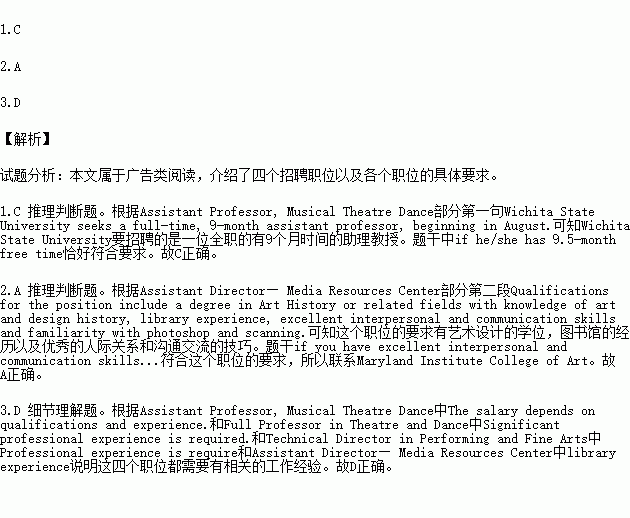题目内容
Assistant Professor, Musical Theatre Dance
Wichita State University seeks a full-time, 9-month assistant professor, beginning in August. Applicants are required to have a degree in dance area, teaching experience at a professional or college level, ability to direct and teach stage movement. The salary depends on qualifications and experience.
For complete information visit http://finearts.wichita.edu.
Full Professor in Theatre and Dance
The Department of Theatre & Dance at the University of California at San Diego (http://www-theatre.uscd.edu) is seeking an experienced theatre artist in lighting design. Applicants must work for us for at least one year. Significant professional experience is required. This position is expected to teach at both graduate and undergraduate levels.
A review of applications will start on June 1st. Application deadline: September 1st.
Technical Director in Performing and Fine Arts
DeSales University’s Performing and Fine Arts Department seeks a highly skilled, professional technical director. The position is a 10-month staff position with the possibility of summer employment with the Pennsylvania Shakespeare Festival. Professional experience is required; MFA is preferred.
Please email materials to john.bell@desales.edu. Screening of applications begins immediately and will continue until the position is filled.
Assistant Director— Media Resources Center
Maryland Institute College of Art is seeking an Assistant Director of Media Resources Center in the Academic Affairs Division.
Qualifications for the position include a degree in Art History or related fields with knowledge of art and design history, library experience, excellent interpersonal and communication skills and familiarity with photoshop and scanning.
A review of applications will begin immediately; job announcements will remain open until the position is filled. Applicants are required to work for us at least 11 months. They can send emails to jobs@mica.edu. The salary differs depending on your experience. Please include your desired salary in your application letter.
1.What ad may an applicant pay close attention to if he/she has 9.5-month free time?
A. Technical Director in Performing and Fine Arts.
B. Assistant Director— Media Resources Center.
C. Assistant Professor, Musical Theatre Dance.
D. Full Professor in Theatre and Dance.
2.Which can you apply to if you have excellent interpersonal and communication skills?
A. Maryland Institute College of Art.
B. The University of California.
C. DeSales University.
D. Wichita State University.
3.What can we learn from the advertisements?
A. All the job announcements will remain open until the positions are filled.
B. All the reviews of applications will begin immediately.
C. All the jobs mentioned above promise a good salary.
D. All the jobs mentioned in the text require experience.
The Metropolitan Museum of Art (Met) is one of the world’s largest and finest art museums. Following the suggested route will help you explore the museum.
The Temple of Dendur
This 2000-year-old building stood near the Nile River, surrounded by a wall that no longer exists. But you can still peek through the gateway. Whose “house” is this? It's not for people. It’s for gods. Can you identify them? They face out. A king faces in, bringing offerings.
MetSpeaks
Bringing together some of the most respected thinkers on a given subject, MetSpeaks features lectures, discussions, talks, films, and forums in which compelling voices explore timely issues that connect to the Met’s exhibitions and permanent collection. Program times, audiences, and topics vary.
Time to Sketch
Settle down for a few minutes, pick something in this gallery, and have fun drawing it. Enjoy the chance to look carefully as you create your own sketch. You'll be surprised at how much more you notice, thanks to exploring art by sketching.
MetAccess
Make the Met yours! Choose from a variety of services and exciting programs that are tailored to meet the needs of visitors with disabilities. Program times, audiences, and topics vary.
Ask for the Access Information brochure and Access Calendar at Information Desks, download the Access Calendar (PDF), or call 212-650-2010 or email access@metmuseum.org.
Admission
Fee includes admission to the Main Building and same-week admission to the Cloisters museum and gardens.
Recommended | Fee |
Adults | $25 |
Seniors (65 and older) | $17 |
Students | $12 |
Members (Join Now) | Free |
Children under 12 (accompanied by an adult) | Free |
1.How much is recommended to pay for 3 adult and 2 student visitors?
A. 99 B. 111 C. 87 D. 103
2.What can you know about the Temple of Dendur?
A. A high wall is surrounding the 2000-year-old building now.
B. A king faces out, bringing offerings in the temple.
C. The building is designed for Emperor to live in.
D. The Nile River witnessed the history of the building.
3.Which of the following is TRUE about the Met?
A. Issues connected with economic crisis will be discussed in MetSpeaks.
B. Visitors can choose something in the gallery and have fun drawing it on the wall.
C. Disabled people will find various services and programs offered especially for them.
D. You can email access@metmuseum.org for more Admission information.

